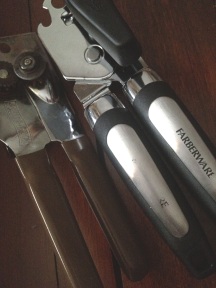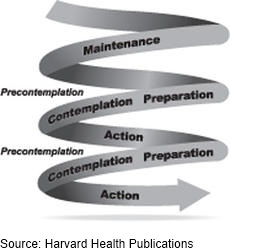I must admit I wasn’t so keen on the new kitchen gadget when my mother insisted on buying me a new one.
“I don’t need a new can opener,” I replied to her, “the one I have is just fine. Besides they don’t make things like they used to.”
But the truth is, the old one had started to slip and I found myself running it back and forth over the uncut portions of the can.
Why we resist change
I do recognize that there were two dynamics in play, the first being that I was used to the quirks of this utensil that has served me so well since the day I claimed it from the discard pile. I was helping a friend clean out her mother’s house after she’d moved her elder into an adult residency.
I’d recently purchased a new can opener, which had literally fallen apart in my hand when I squeezed the handles together, not too many months after I’d brought it home.
“Can I have this?” I’d asked my friend. “They don’t make things like they used to. This one looks good and sturdy.”
And sturdy it has been for years now.
So when my mom asked me what I wanted her to do with the old one, I instructed her to leave it in the drawer. Surely I will need its services when this new one explodes. Or fails.
The second dynamic is that I don’t like to give up on anything until I know that it no longer has any use, or until I believe I have exhausted every possible option.
If I don’t wear an article of clothing until it is stretched out or threadbare, I take it to a local church’s clothing hut.
I donated my children’s quickly-outgrown items to the school nurse, who was always in need of spares for students who came upon some mishap during the school day.
And I recycle everything. Well, almost everything.
That old opener still had life in it and, by God, I wasn’t throwin’ it out until it totally went kaput.
Aren’t there starving people somewhere?
Silly as this little kitchen contraption story is, it is indicative of how we tend to look at change.
How many times have you heard someone say, or said yourself, “Change is hard?”
Sherrie Bourg Carter Psy.D, in her piece, Change is Hard, Here’s Why You Should Keep Trying, says, “Change is hard. But people tackle hard projects all the time.”
But here’s an even better truth: People succeed in meeting the challenges of difficult tasks all the time.
The elements that comprise change
The Precontemplation phase is a period where one doesn’t recognize that change is either needed or desired.
I find the Contemplation phase most interesting, the timeframe in which a person acknowledges that changes are wanted or required, but hasn’t reached the point of committing to modify her lifestyle.
I spent plenty of time in this stage before I finally kicked my smoking addiction to the curb.
In the Action phase one is actually making adjustments to her behavior in an effort to achieve an expected or anticipated result.
This spiral of this model accounts for periods of relapse.
As complex as this process turns out to be, there is one simple fact about change: When we make an alteration in our lives, bring something new into it, something old must go.
It’s pointless to hold onto fascinations that no longer work for us, to leave them hanging out in the drawers of our lives.
(Excuse me while I run to the kitchen to throw that brown can opener into the trash bin.)
But we become so content with our usual ways that they fit us like our comfiest, worn pair of shoes.
And we resist letting go.
When I was standing in the shower, morning after morning, nearly hacking up a lung from coughing fits, quitting smoking was the most logical approach, and yet it took me years to finally engage in committed action toward cessation.
Putting a new spin on change
When I did decide to quit, I had to replace my addictive behavior andthe cigarettes with something else.
I chose the tip of using water as my new go-to fix. Not only would the fluid help flush the nicotine from my system, I needed to incorporate more into my diet.
I reprogrammed my brain to say water whenever the nicotine trigger was engaged.
I love cold water. The colder the better.
Instead of focusing on what I was missing, I paid attention to the thirst quenching and refreshing nature of the icy beverage.
I replaced the cigarette itself with Big Red gum. The fiery flavor seemed to satisfy my taste buds and the chewing action took the place of the puffing. I embraced the tingling sensation with each chomp.
If we can look at change as something fresh and exciting as opposed to something dreadful and daunting, it’s not only easier to adapt our ways, it becomes enjoyable.
What about you? Do you tend to be open to change? Do you often face change with ambivalence or do you attack it with fervor? If you have made a big change in your life, share your tips and tricks here.
Soon…




